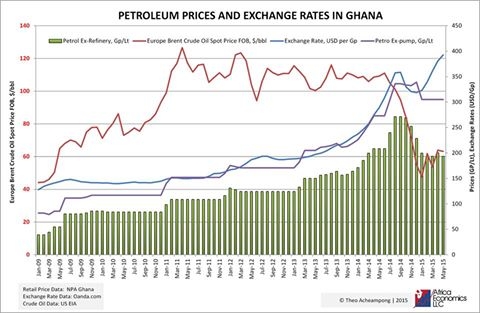
For those complaining about recent hikes in petroleum prices, it is important to note that the main driver of these increments is the exchange rate —- see chart 1 below. Therefore, though prices of crude oil have fallen on the international markets, the cedi’s wobbly performance against the US dollar since early last year implies that any gains in lower international prices are quickly offset by the volatile FX regime. Cumulatively, the cedi has lost over 60% of its value against the dollar since 2014 – a 30% deprecation year-to-date alone.
Petroleum products imported into the country by the Bulk Distribution Companies (BDCs) are regulated by the NPA with an objective of ensuring FULL COST RECOVERY, government revenue generation and uniformity of prices through the through the Unified Petroleum Price Fund (UPPF). Full cost recovery within the value chain is based on the import parity pricing (IPP) benchmark. The IPP benchmark is the ‘landed cost’ of refined fuel to Ghana, which includes the international price for refined fuel brought in from Rotterdam for example (Freight on Board (FOB) Price), freight charges, exchange rate, customs and port duties, insurance and losses.
It represents the price that the BDCs (importers) would pay in case of actual import of product at the respective Ghanaian ports. The rationale behind the IPP benchmark is to have a strong relationship with the actual costs of fuel imports into Ghana taking into account global developments. Ancillary charges such as port duties are then added to arrive at the Ex-refinery price calculated in Ghana pesewas per litre. Approved taxes and levies passed by Parliament are then added along with various OMC (distribution) margins to arrive at the final Ex-pump price, which is the price the public buys fuel at the various filling stations. Another important point to note is that fuel taxes and margins typically make up about 35-40% of ex-pump fuel prices — see chart 2.
Na who cause am? Don’t blame the OMCs and BDCs, blame instead the incompetent and besotted managers of this economy!
By: Theo Acheampong


